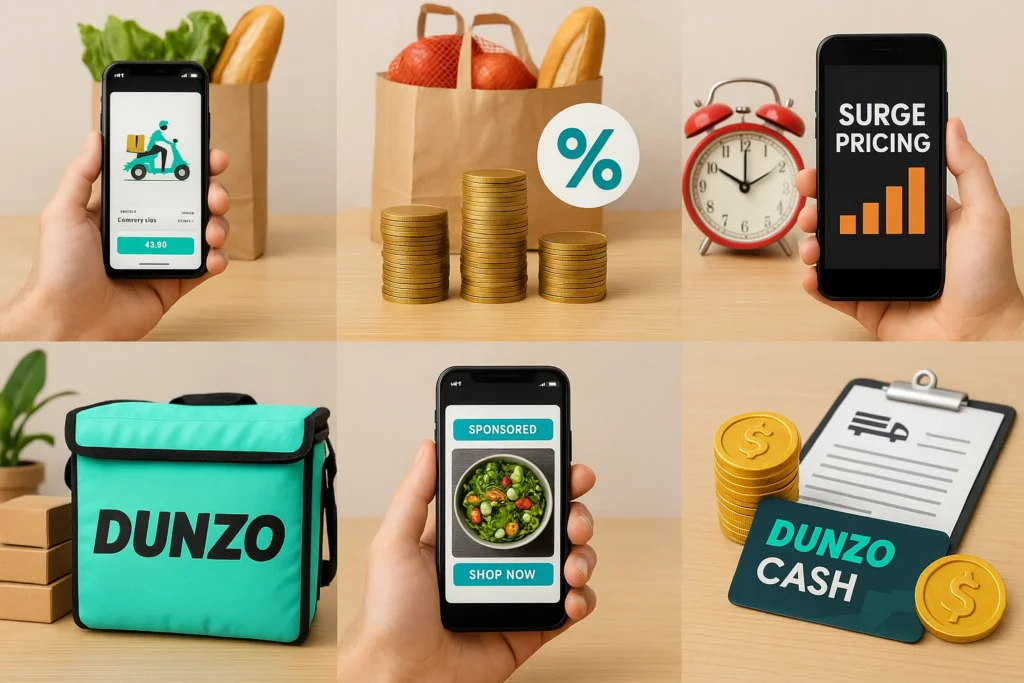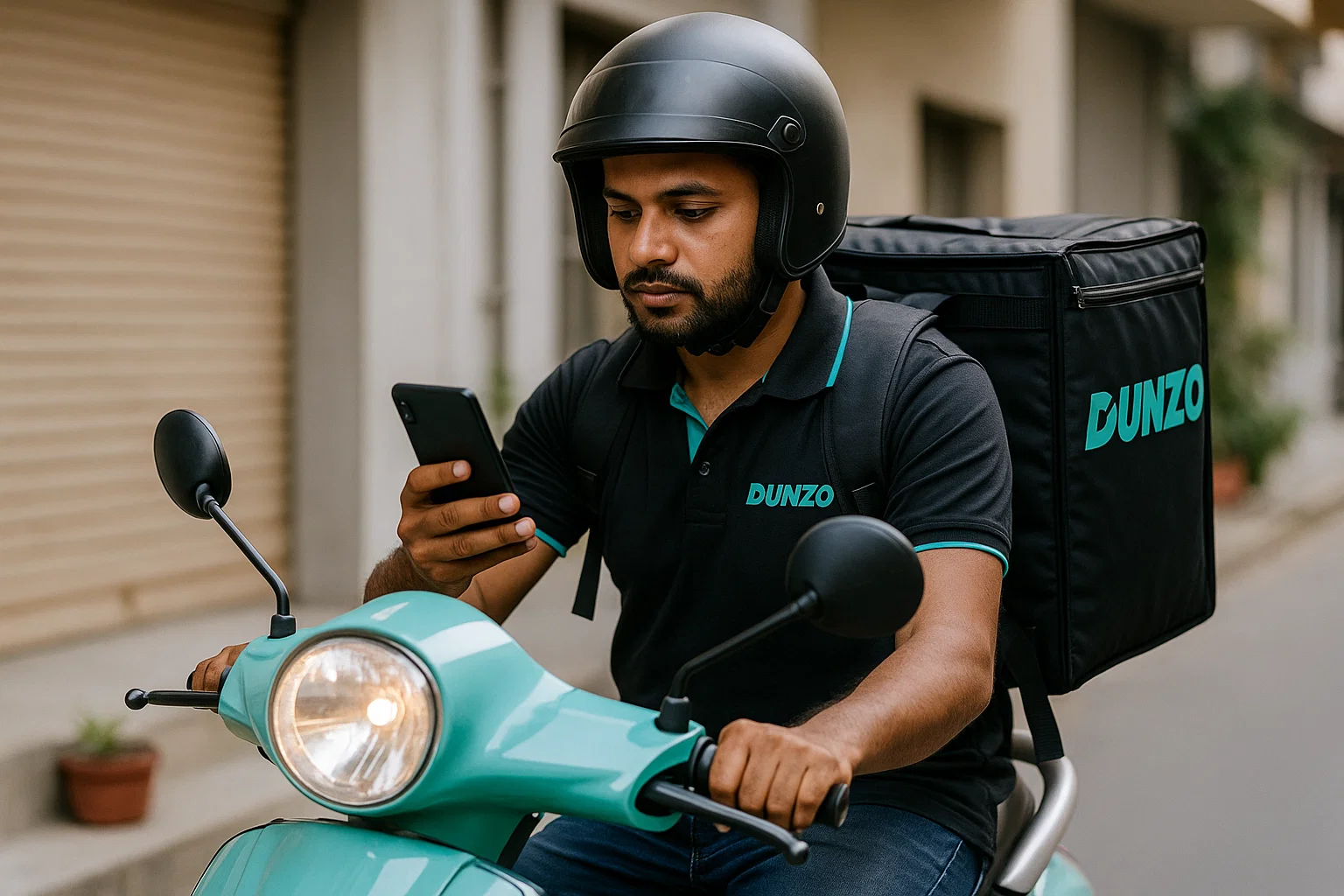Dunzo has emerged as one of India’s most dynamic hyperlocal delivery platforms, offering everything from groceries and medicines to food and pet supplies—delivered in under an hour. With its “anything delivered” promise, Dunzo has carved a niche in the crowded on-demand space by focusing on convenience, speed, and versatility.
For startup founders and digital entrepreneurs, understanding the revenue model of Dunzo offers valuable insights into building a scalable, logistics-driven business. As consumer expectations for instant delivery continue to rise, Dunzo’s monetization strategy shows how to turn operational efficiency into sustainable income.
In this blog, we’ll break down how Dunzo earns money, explore each revenue stream in depth, and explain how Miracuves can help you replicate this model with a customizable Dunzo clone.
How Dunzo Makes Money
- Delivery Fees: Charges to customers based on distance, order type, and urgency.
- Commission from Merchants: Percentage cut from partner stores on every order placed through the app.
- Surge Pricing & Convenience Fees: Extra charges during peak hours or high-demand periods.
- Dunzo for Business (B2B): Delivery services for local businesses, restaurants, pharmacies, and retailers.
- In-App Advertising: Promotional slots for local businesses to boost visibility inside the app.
- Subscription Plans: Dunzo Cash or Pass-style memberships offering free deliveries or discounts.
- Logistics-as-a-Service: White-label delivery for enterprise clients using Dunzo’s fleet infrastructure.
Dunzo blends convenience with a hyperlocal delivery network, monetizing through commissions, ads, and partnerships—dive into the Dunzo business model to see how it all fits together.

Detailed Breakdown of Revenue Channels
Delivery Fees
One of Dunzo’s primary revenue sources is the delivery fee charged to users. This fee varies based on:
- The distance between pickup and drop
- Time of day (e.g., late-night or peak hours)
- Type of item (e.g., groceries vs. heavy parcels)
Typically, Dunzo charges between ₹10 to ₹70 per delivery, but rates may go higher with added urgency or long-distance deliveries. This fee directly contributes to operational revenue and helps offset rider costs.
Commission from Merchants
Dunzo partners with grocery stores, pharmacies, pet shops, and restaurants to list their products. For every successful transaction routed through the app, Dunzo earns a commission—usually ranging from 10% to 25% of the order value. This B2B revenue stream scales well with more partners and higher order volumes.
Surge Pricing & Convenience Fees
During high-demand periods—such as weekends, rain, festivals, or late evenings—Dunzo applies a surge fee or convenience charge. These dynamic pricing models not only help manage delivery load but also increase per-order profitability.
Dunzo for Business (B2B)
Dunzo offers on-demand logistics services to local businesses, including:
- Restaurants needing food delivery
- Retailers shipping items to customers
- Pharmacies distributing medical products
Businesses either pay per delivery or sign up for monthly logistics support. This model creates recurring income and diversifies Dunzo’s client base beyond consumers.
In-App Advertising
Dunzo monetizes its app traffic by selling advertising space to local vendors and brands. Businesses can pay for:
- Priority listing in search
- Featured placement on category pages
- Targeted promotions or coupons
With a highly engaged user base, this ad-based revenue stream is increasingly valuable.
Subscription Plans
To encourage loyalty and increase order frequency, Dunzo offers premium plans (like Dunzo Cash or Dunzo Pass). Subscribers get benefits such as:
- Free or discounted deliveries
- Exclusive offers
- Priority support
This model ensures a steady inflow of recurring revenue while improving customer retention.
Logistics-as-a-Service
Dunzo has started offering its logistics infrastructure to third-party platforms and enterprise clients. This includes last-mile delivery services for businesses that need to fulfill online or offline orders without building their own fleet. As a white-label service, it adds another scalable layer to Dunzo’s monetization engine.
Dunzo’s strength lies in its seamless app experience backed by smart logistics—discover the Dunzo app features that make deliveries effortless.
Why This Revenue Model Works in 2025
Boom in Quick Commerce and Instant Gratification
In 2025, customer expectations around delivery speed are at an all-time high. Whether it’s forgotten groceries, urgent medication, or a last-minute party item, people expect their needs to be met in under 30 minutes. Dunzo’s revenue model thrives in this environment by offering flexible pricing (surge + delivery fees) that aligns directly with demand.
Growing Demand for Hyperlocal Convenience
With urban congestion and changing lifestyles, hyperlocal delivery apps like Dunzo have become indispensable. Small businesses now depend on platforms like Dunzo to reach local customers quickly without setting up their own delivery teams. This fuels growth in both B2C and B2B revenue channels.
Rising Willingness to Pay for Time-Saving Services
Consumers in metro cities are increasingly valuing their time over money. Paying an extra ₹20–₹50 for instant delivery or avoiding store runs is now considered acceptable. Dunzo’s dynamic pricing and subscription models cater directly to this mindset—making one-time charges and recurring fees both viable.
Retail Digitization Fuels Merchant Partnerships
As more local stores digitize post-pandemic, they seek platforms to increase sales without building tech or delivery infrastructure. Dunzo’s commission model benefits from this shift by onboarding more merchant partners and expanding product diversity within the app.
Scalable Infrastructure Enables B2B Expansion
Dunzo’s delivery network isn’t limited to individual users—it’s increasingly being used by businesses for same-day delivery. This shift opens up a more stable and often higher-margin revenue stream through contracts and bulk deliveries, making the business model less reliant on consumer orders alone.
AI-Driven Optimization Enhances Profitability
In 2025, Dunzo uses AI for route planning, rider assignment, and demand prediction. These improvements reduce delivery times and fuel usage, optimize fleet utilization, and increase the number of deliveries per hour—boosting margins even in a high-volume, low-ticket-value market.
Dunzo didn’t just market deliveries—it marketed convenience and trust, turning users into advocates—see how the Dunzo app marketing strategy built installs and loyalty.
Can Startups Replicate Dunzo’s Revenue Model?
Challenges of Building from Scratch
While the idea of launching a Dunzo-style app may sound exciting, building such a platform from the ground up comes with major hurdles:
- Complex logistics and real-time delivery tracking
- Smart order-routing and rider management
- Merchant onboarding and multi-location integrations
- Dynamic pricing and payment processing
- Scalable architecture for both B2C and B2B operations
It takes years of development, testing, and operational fine-tuning—not to mention a significant upfront investment—to replicate even part of Dunzo’s tech and logistics ecosystem.
Launch Faster with Miracuves’ Dunzo Clone Solution
That’s where Miracuves comes in. Our Dunzo clone is a robust, white-label solution designed for startups and digital entrepreneurs who want to tap into the hyperlocal delivery wave without reinventing the wheel.
Our solution includes:
- Customer and delivery partner apps (iOS + Android)
- Real-time GPS tracking and smart route optimization
- Merchant dashboards and in-app advertising modules
- Admin panel to manage deliveries, fees, and subscriptions
- Monetization tools like surge pricing, commissions, and premium plans
Monetization Flexibility from Day One
With Miracuves, you can customize revenue streams to match your target market. Whether you want to focus on grocery delivery, courier services, B2B logistics, or a combination of verticals, we give you the tools to:
- Charge delivery and convenience fees
- Earn commissions from local merchants
- Offer loyalty programs and subscriptions
- Enable local advertising inside your app
- Expand into white-label logistics for enterprises
By combining Dunzo’s proven monetization model with Miracuves’ turnkey technology, you can launch quickly, scale easily, and monetize efficiently.
The Dunzo Clone by Miracuves is priced at $2,899, offering a fully customizable on-demand delivery platform for groceries, parcels, and more — ready to go live within 3-9 days.
Launching your own hyperlocal delivery platform starts with the best Dunzo clone scripts in 2025, gets technical with our developer’s tutorial on building a Dunzo-like app, and becomes achievable when you plan ahead using the cost to develop a Dunzo app.
Conclusion
Dunzo’s revenue model is a masterclass in monetizing hyperlocal delivery—balancing consumer convenience, merchant partnerships, and scalable logistics infrastructure. From delivery charges and commissions to business services and in-app ads, it has crafted a multifaceted strategy that thrives in urban, on-demand environments.
For startup founders looking to enter this booming space, the opportunity is real—but the execution is complex. Instead of building from scratch, you can fast-track your journey with Miracuves’ ready-made Dunzo clone. It’s built for speed, scalability, and monetization—so you can focus on growing your delivery empire.
FAQs
How does Dunzo generate revenue?
Dunzo earns through delivery fees, merchant commissions, surge pricing, in-app ads, business deliveries, and subscription plans.
Is Dunzo profitable in 2025?
While Dunzo continues to invest heavily in growth, it has optimized many revenue channels in 2025—especially B2B services and dynamic pricing—to edge closer to profitability.
What are the main income sources for Dunzo?
Key income streams include customer delivery charges, partner store commissions, peak-hour surcharges, logistics for businesses, and local app advertising.
Can startups use the same revenue model as Dunzo?
Yes, startups can replicate Dunzo’s model by leveraging ready-made solutions like Miracuves’ Dunzo clone, which includes the same monetization features.
Does Miracuves offer a Dunzo clone with monetization features?
Absolutely. Miracuves provides a white-label Dunzo clone complete with commission settings, surge fees, in-app ads, subscriptions, and enterprise delivery modules.
Related Articles :-
- Revenue Model of HungerStation: How Saudi Arabia’s Food Delivery Leader Drives Profit
- Revenue Model of OneCart: How South Africa’s Fast-Growing Delivery App Makes Money
- Revenue Model of Just Eat: How the Food Delivery Giant Monetizes Every Order
- Revenue Model of FreshDirect: How the Grocery Delivery Pioneer Makes Money
- Revenue Model of Glovo: How the Delivery App Makes Money in 2025








